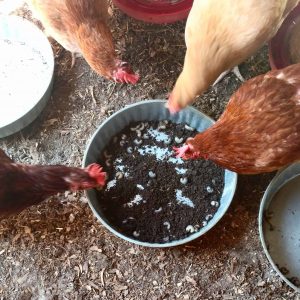Realistic goals to make on the homestead
Setting up realistic short-term and long-term goals on the homestead is one of the most important steps you’ll take in all your years. When Emerson and I bought our homestead, we failed to set up realistic goals.
I’ll go over gardening, animal husbandry, fruit trees and more in this guide. Are you ready to set realistic goals?

Table of contents
Why is it important to set realistic goals?
Starting a homestead can be overwhelming, to say the least. You’ll be best equipped to thrive on your homestead by setting up short-term and long-term realistic goals.
For example, I thought it would take us a year to be self-sufficient, growing our own produce and raising all our own meat. Since neither of us had the slightest idea of what we were doing, those goals were far-fetched.
The best short-term realistic goals are getting garden beds set up, starting a solid laying flock of hens and choosing a source of meat to start raising.
Short-term goals consist mainly of making plans if you’re starting completely from scratch. Buying a few great books can be a huge help when you’re a beginning homesteader.
Long-term goals consist of your 1, 3 and 5 year plans. They’re a little harder to write out because they’re going to change…and probably a lot.
Realistic, larger goals to make are to plan to have a nice pantry of preserved food, a stocked freezer full of meat and a solid understanding of the sun angles in your yard for gardening.
Without understanding, observing and being patient then none of your goals will be achieved. Here are 6 realistic goals you can make today as a beginning homesteader.
Realistic goals number 1: Gardening
When you’re beginning homesteading, it’s important to know where to start. A garden is a perfect place!
MAke the goal in your first year on the homestead is to just grow one successful garden. My biggest mistake with having the goals I did was I didn’t understand my area.
I moved to a different area with a slightly different climate but treated it the same. I had no idea what the weather and seasons would hold and how different they would be, setting myself up for failure.
Plant the easy crops for your first season of gardening. If your first season is taking place in the hotter months then put down heat-tolerant vegetables.
A chillier than expected? Try some kale, arugula, lettuce and other salad greens.
Meet your neighbors if you have them. Reach out to your county extension office and network with some fellow gardeners.
The advice I’ve received from the folks who’ve been in this area their whole lives has often been better advice than what I can find on the internet.
Take their advice, write it down, and apply it every year forward if the advice deemed itself successful. This will actually help you achieve the
Goal #1.5 is to start composting! It is never the wrong time to start a compost pile and learn to successfully produce your own soil. Not only is it a healthy option for your gardens, but you’ll have more control over what you had each season.
Make a plan to learn about animal husbandry
Your second realistic goal to make is getting to know your animals. Also, learn to properly raise and cull them.
Learning to cull a duck alone for the first time was a real experience, and you can read about it here.
I originally had goals to have goats in my first year, and many people do get goats their first year. That wasn’t the best idea for our situation, making in a unrealistic goal to make.
My husband and I had no experience with farm animals. Chickens were already a foreign animal to us and I was scared of them at first.
We were raising 10 too many chickens, bought 10 more ducks, and 5 rabbits within our first 3 months on the homestead. When we started raising meat chickens we had never culled an animal.
It’s pretty intimidating as a beginner when you order 10 ducks and in 3-4 months half of those cute little ducks are supposed to be dinner. It was a little discouraging.
The best thing to do is find someone who’s raised and culled animals before and have a chat with them. They might even let you watch or help them at some point for practice.
I’ve culled a decent amount of animals but I still have so many questions. Also, it’s always okay to have “beginner” type goals, so keep that in mind.

Plan for fruit trees
Your third goal is to not go broke buying fruit trees but also to start planning for them early. Fruit trees can be hard to raise, but they take time to get established.
If there was ever a project I’d tell someone to start before completely learning about, it would be fruit trees. I bought this book when I started and it helped tremendously.
We thought we’d have an orchard in full-throttle by the end of the first year, no doubt! But that’s not how most fruit trees work.
Unless you’re buying expensive, older trees you probably won’t get fruit for 3-5 years. We did get a head start as far as fruit trees go since we bought the land with fruit trees, but that was just luck.
Even then, many of those trees didn’t produce our first year because the past owner didn’t keep up with the health of the tree very well.
My advice to you for fruit trees is to get to know your local nurseries and, when they have sales, take advantage of them.
Emerson and I are kicking ourselves because Tractor Supply recently had their fruit trees on sale for $14 dollars each. We waited 4 days and that price just right back up to $35 a piece.
Slowly grow your orchard, but don’t have it in your mind that you’ll have it together by the first year unless you are financially able to buy older trees.

Set realistic goals about your yard
It’s okay for your yard to not be as groomed as it was when you bought it.
When we viewed our house, the property was stunning. The yard was professionally groomed, the trees were blooming, the lots had animals in them and it looked like a dream.
I still dream about the way the yard looked when we bought it!
Since we immediately started pursuing new projects, our yard quickly looked like a project yard. Two years is how long it took for me to feel comfortable enough inviting people over for cookouts in our outdoor kitchen and fires in the ginormous fire pit.
I’d started and stopped so many projects within the first year that the yard just constantly looked like a construction site!
We have 1.25 acres and that’s a large amount of space when you don’t know what to do with it. It’s okay for your yard to be a little messy at first.
You’re not going to immediately know where you want this and that and that’s totally fine. If you’re anything like myself, you won’t really know how to take care of a yard because it’s your first house and there was no yard maintenance course in school.
You’ll learn soon enough, as with everything else.
Make clear documentation goals
Maybe the most important goal you should make for your first year is to get in the habit of documenting everything.
I didn’t document a single thing my first year or even use a garden planner. Year number two just felt like I was starting all over again! I had no memory of the weather, what sprouted when or how long it took the chicks to mature.
My second year I documented every single thing. Now, going into the Fall gardening season, I have a much tighter grasp on what I should plant and when.
I understand the animals, have a set schedule for their upbringing and what date they’ll be mature or ready to be culled.
Take notes, write in a diary, whatever you have to do in that first year. I wish somebody would’ve hammered this into my head when we began back in February 2016 but I learned the hard way and hope you don’t follow in my footsteps.
Finally, have patience.
What is a realistic goal without patience? I’m adding this because it’s a goal I didn’t have
It’s so very easy to feel impatient when you’re beginning. The animals aren’t growing quick enough, the trees aren’t producing enough fruit, the gardens haven’t yet sprouted… your yard looks like a bomb went off.
Be patient and know that, in time, all of these little things will fall into place. You’ll find your groove, you’ll doubt yourself less, and you’ll become a little more connected with every day that passes.
I’ve had many low ruts during my journey fighting homestead burnout where quitting seemed so easy, so convenient, and so right. I promise you there are 1,000 wonderful, invigorating experiences to come for each one terrible one you’ll encounter.
How to set realistic goals
You don’t have to struggle in the beginning. Sit down, grab a pencil and piece of paper and write down what you want from your land.
Think about where you want to be in 6 months, 1 year, 3 year and 5 years. Do you have a partner? Ask them what they see from the land.
After finding land for your homestead and moving, you’ve made the first amazing step. Next, make lists, map out where you want to be in the end and then get started. Good luck!



Chel, I appreciate the openness and honesty of this post. We are still a couple years out from selling our home and completing the transition to the homestead lifestyle. A bit too late for you, but definitely for those thinking about embracing a self-reliant lifestyle, start now. My wife and I took on building our gardening skills; raising chickens for meat and eggs; developing welding, carpentry, and general handyman skills; and other important skills such as canning, spinning and knitting. Moreover, we have embraced educating ourselves be it through blogs and face-to-face; checking out property in desired locations; and continuously finding new areas to develop. My point, jumping all in doesn’t begin the day you move to your property. It begins and is developed over time. Set yourself up for success by preparing, problem solving, and persevering through the discomforts of learning new skill sets life no before you set foot on your land — good luck and happy homesteading.
Hi Frank! Thank you for reading my post and I always strive for 100% honesty, so I’m so glad that came through. I agree completely with everything you just said! When my husband and I started this lifestyle 3 years ago we knew NOTHING and paid for it in a lot of ways. This has been the greatest journey and learning experience of my life; it’s truly become a passion. I’ve learned to embrace failing because it means I get to learn, and I feel that is a wonderful thing. I wish you and your wife the very best of luck with all your endeavors and transitioning. I still have things to learn that you have learned! (canning, welding, etc.). Feel free to stick around and sign up for my email list, I tell my email subscribers all the behind the scenes type of stuff. I’d love to hear about your journey along the way! Good luck to you and I’ll “see” your around!